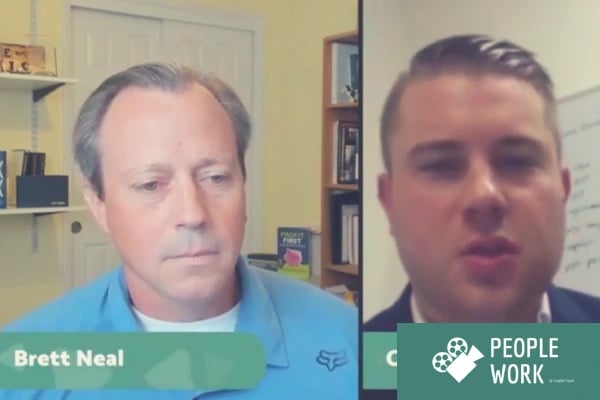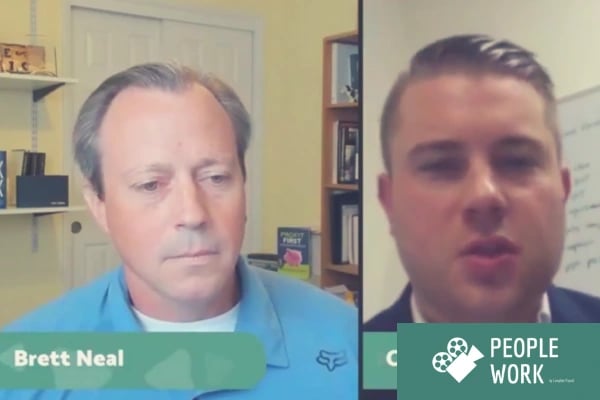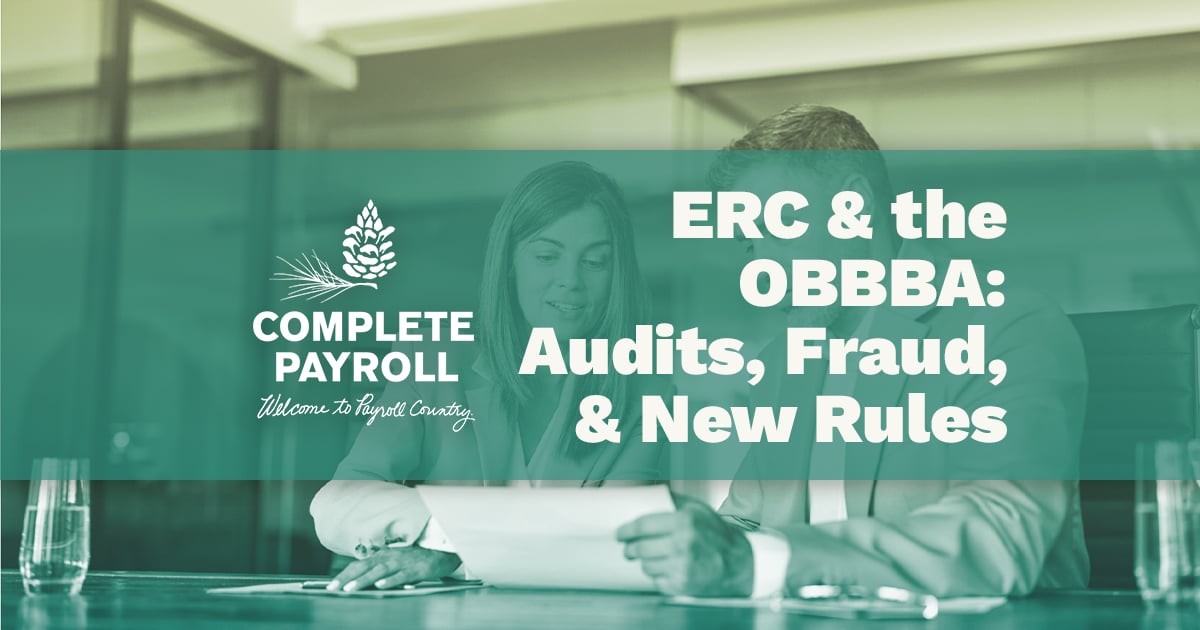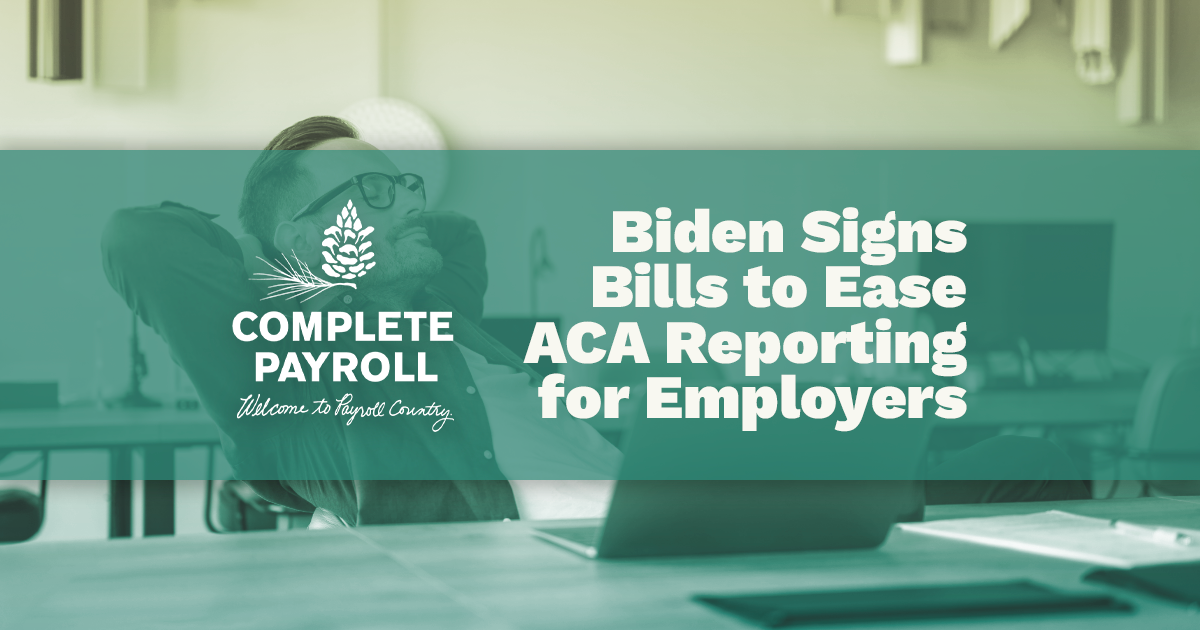PeopleWork 06 - CPA Brett Neal on Reasonable Compensation

Written by Complete Payroll


In this episode of PeopleWork, we are joined by California-based CPA Brett Neal. Brett came on the show to discuss the important topic of reasonable compensation and how it applies to owners and partners of C-corporations and S-corporations. You can watch the full conversation and read the complete transcript below.
Watch the Conversation
You can watch the full conversation between CJ and Brett below.
Read the Transcript
CJ: Hey everybody, CJ Maurer here, back with another episode of People Work, where we talk to experts in various fields of human capital management to talk about how to run a business and how to manage a workforce most effectively. Today, I'm really excited to be joined by a CPA named Brett Neal out in central California near Fresno. What's really cool about Brett is, as maybe some of you know, that here at Complete Payroll, we are really big on sharing content and educating people proactively about payroll, HR, labor laws, or anything that relates to human capital management. Brett and I actually connected on Twitter. He had been following us, noticing some of the content that we had put out there. We started engaging and talking. We've been really impressed with Brett's initiative to be a content leader in his field of accounting, as well. So, we connected and we decided it'd be a really good idea to talk about one of the most important, and yet overlooked tax issues that a lot of employers face. So, he's gonna help you guys out in the next couple of minutes here.
First of all, Brett, I just want to say thanks for coming on.
Brett: Hey CJ. Thanks for having me. It's a pleasure to be on this show. I think, gosh, it's been a while. We touched base on this probably like six months ago. I think that was one of the first times I had seen one of the posts from your company. It had to do with New York taxes, New York City taxes. We have a client in New York City and we deal with payroll with them. I went and I watched your blog and watched the video. Then I think I made a comment on Twitter like, "Hey check these people out. They have some good information." And it started from there.
Yeah, we appreciate that. That's a perfect reason why we do it, so kudos to you for taking advantage of that. But now the tables are gonna turn because where we are often the content leader or the topic educator, now it's your turn. Brett is here. He's gonna talk about reasonable accommodation. Excuse me, reasonable compensation.
Reasonable compensation.
I just got through some New York labor law stuff with employees where we were talking about reasonable accommodation. We're talking about reasonable compensation. Brett, for all of the business owners out there, what is reasonable compensation and why should it matter to them?
Reasonable compensation is defined in the internal revenue code as basically reasonable for services actually rendered. Who is this important to? It's important to S-Corp shareholders and C-Corp shareholders. More specifically, owners that are also shareholders in those companies. If you're an employee to your company, you're gonna be expected to take some fair wage, a reasonable wage, and that's really where this comes from.
How does a business owner or the IRS or anybody determine what a reasonable wage is?
That's gonna be the hardest part and we're gonna talk about it as we go through some of our discussion points. It's not defined, but what we're gonna look at is a fair market value. I mean, if I were to answer the question specifically, it's what would you be paid if you worked in a similar position in a similar company doing similar things? So, you own a company, you're a shareholder, you're the one really making your company go, but if you're turning that around and you held that position in a different company, what would they pay you? That's gonna be a good starting spot for your reasonable wage.
Why does it affect S-Corps and C-Corps more than other legal entities?
Specifically what we're looking at is closely held corporations or family corporations. Not family corporations, but closely held family businesses. Shareholders that are employees that don't take reasonable wage in an S-Corporation are effectively avoiding self employment taxes. The government frowns obviously on that kind of maneuver. It's not necessarily understood. You may not even be doing it intentionally. But what could happen is the IRS could come back and reclassify maybe some of your distributions as wages, and then you're gonna be expected to refile tax returns, payroll tax returns, maybe have penalties. It's just a trouble that you want to avoid from the beginning.
To be clear, just to make sure that I'm understanding this, and I would guess that this would be the case, but I would rather have you confirm. The biggest issue when it comes to reasonable accommodation is that business owners try to limit how much they take from the company as employee wages to minimize their tax liability, correct?
Right, exactly. An S-Corporation, if we flow through income on a K1, then that's not subject to self employment tax. If I minimize my wage, then I'm gonna flow through more net income on a K1 and not pay self employment tax.
Got it. So, you talked about some of the consequences if the IRS goes back and catches you and reclassifies some of your cash flow as wages. There could be penalties. I guess not just the penalties, but overall talk about what are the consequences of not doing this the right way?
I laugh because what comes up in discussion is social security. Will there be a social security for the rest of us when we're ready to retire? I feel like this is what the IRS is chasing on your behalf. It basically comes down to don't mess with the trust fund. When we pay our social security and our Medicare taxes, it essentially goes into one big bank account that the IRS then and social security distribute via for social security, Medicare on our behalf. To be sure that it's funded, we have to make sure that employers are paying their fair share, as well as employees. So, businesses have to collect it and then submit it on a quarterly basis. As a payroll company, you guys know that kind of stuff.
The penalty is, is if you get in trouble, that's like the big caveat. The trust fund penalty. They use that account to say, "Hey look, if you've touched this or messed with it in any way, we're coming after you. We're gonna figure out what went wrong with your business. We're gonna assess the penalties." The additional issues are having to amend payroll tax returns, and this could go back three, four years. So, if you start talking about amended quarterly payroll returns, your business tax return, and having wages, you're also going to be amending your individual income tax returns, and you're gonna have fines and penalties at every level.
How does the IRS figure this out?
So, where are they looking? They're obviously going to be looking at business returns, specifically S-Corporations and C-Corporations that are closely held. So, one shareholder, two shareholders, maybe people that own more than 50% that are also employees within those corporations. But they're also gonna look at an individual's tax return as well. If you have a schedule E, a K1 being flowed through to your individual return, then you probably have a schedule E on your income tax return, and you would see that income be reported on line 17. So, if I was an IRS agent, I could see that there's income on line 17, and there is no income on line 7, and that's wages. That's gonna be an alert for me. Then like I ... Go ahead.
So, that's effectively an alert that the IRS sees that you are claiming wages on your personal tax return, but not paying yourself wages on your business tax return?
What they're gonna see ... Right, if there's no wages on your individual income tax return, but there is the wage, right, but there's the net income flowing through from your business, that's gonna be the quick comparison on your individual return.
So I imagine this is something that probably isn't terribly complicated for them to flag.
Yeah, I don't think so. Then the next level is just looking at the business return. Because I see the association on your individual return, I can go straight to your business return and I can see owner's compensation versus net income, maybe versus dividends or distributions, and it's easy to make a comparison.
If you are, let's suppose that you are the owner of an S-Corp or a C-Corp, and you're thinking to yourself, "Well this sounds like something that maybe I could be flagged for," or, "It sounds like something that I could be doing right now and I want to get out ahead of this and resolve this," what advice would you have for them?
Especially since it's year end, hopefully you're on top of your books. You have clean books and records and you have an idea of what your net profit is for the year. If you were to make a projection, you only have to make a projection out for the last quarter, the last three months. But a good rule of thumb, and this is something the IRS is looking at as well, is a 1:1 ratio. Basically, does my compensation equal my net income in my business? If I have a business that nets $150000 of income and I have zero wages, obviously there's a flag there. Easily right now is I could just say, "Hey let's pay myself half that, 75000. Now my 75000 in wages equals my 75000 in net income. At least I'm making an attempt." We haven't defined reasonable compensation, but at least you're making an attempt, and you're reducing yourself for an audit.
You talk about the 1:1 ratio, but what if ... Earlier you mentioned fair market value. So, what if the 1:1 ratio, applying that does not give your salary a fair market value?
Yeah, that's gonna be a good question. So, fact and circumstance. What your position in that company, how much effort are you really putting forth? Traditional service based companies, if you're the sole shareholder, you're also pretty much the worker. You're the one doing all the work that makes the income for the business. If you don't have employees or something like that, you're really not leveraging yourself. So, there could be an argument made that almost 100% of the income should be wages. Vice versa, if you have a workforce or a staff, one, two, three, ten employees you become leveraged and the inputs from the company aren't as much from you as they are from the team, so then you can begin to argue that your reasonable wage is not gonna be as much.
Where fair market value comes into play is basically looking outside the box, comparing yourself to others. You have to look at your competitors, maybe go to a resource, find a guide in what's the proper wage within that market.
So, looking at your competitors. What about within your own company? I would imagine a lot of business owners might choose to pay themselves less than other key employees in the business. Does that ever run into an issue where traditionally you might assume that C-suite or a CEO might make more than the rest of the employees, or at least C-level employees might make more than managers and directors and other specialists within the company? Is that ever an issue?
Yeah, actually that's a ... If you're going that route, you probably are writing that stuff out in your corporate minutes, and you're probably talking about it among your team. If you have good notes and substantiation for the reasons you've chosen the salaries, that's gonna add to your benefit. But again, if you're paying people, like you say your executive employees and yourself, and you're making the attempt, I mean at the very least you're keeping yourself away from an audit. You're trying to do it right.
That's really what this all comes down to, right? You want to take the necessary steps to prevent getting audited.
Yeah. I mean, you don't want to break the rules specifically, explicitly, when you know you're just doing it wrong. Then exactly, why not do what you can to avoid the audit, or at least avoid the pain if they do come through and re-characterize some of the distributions or some of the wages?
Does the IRS operate with any leniency when they can perhaps tell the difference between an honest mistake, some type of error, a minor oversight, compared to basically chronic and strategic tax evasion?
Gosh, I wouldn't say the IRS puts any kind of ... Probably if you're gonna compare it to a straight up tax evasion, but I kind of don't go with leniency in that manner. I would say more professionalism, honesty and integrity in answering the questions. If you're gonna be ... during the audit, it sounds like, just be someone, be appeasing. Have good information. If you're gonna be kind of, "I don't want to work with the IRS. I don't know why you guys are in my stuff," it's gonna be a bad audit. It's more about relationship I think at that point.
I can understand that. What would you say to, what advice might you have for ... and you maybe already answered this, but I want to ask it in a little bit of a different way. If you had a new client and that client is the owner of an S-Corp, my first question is, how would you be able to identify if they are not paying themselves reasonable compensation? If that is the case, how would you advise them to fix it?
I've got to protect myself too. Taking on a new client is really having that introduction to all those questions. Who are you? What are you guys doing? What's the basis of your business? Where are you heading with it? What's the reason for this existence? Why did you choose me? What's the pain point that I can serve for you? And really getting that foundation to see if it's a trustworthy client, because then we're gonna have that next question. I see that you don't, or do have wages. How do they get determined? Again, what's your long term planning? There's gonna be a lot of new businesses that really don't want to take money out of the business because they want to reinvest it in the company. And that can be fair, and that might just be something you need to substantiate. I'm not saying don't pay yourself just because you want to leave it in the company. That might have to be in your minutes, or something like that, to discuss it's deferred compensation.
Then what we do is I have a three strikes and you're out. Hey, we talked about it. Sometimes you get clients late in the year, or sometimes you get clients right before filing season, and you've just do what they did, and just file that return. And just let them know, "Hey, it's not 100% right. This could come back to you. Let's try to do it right next year." If you're in the same position a year or two out, again we have our three strikes you're out rule. I've put it in the letter. I've talked to you about it. I feel like I can't help you on this or you don't want to do it right. I don't know if we're a good fit anymore.
Yeah, that makes sense. That absolutely makes sense.
It's tough. It's tough because we just want to help. You really want help. You see people doing it and you think, this is an easy fix.
You know, Complete Payroll, as a payroll process and provider, we run into that sometimes too because on one hand, we pay their people. We advice them on labor law. For example, if you are paying manual laborers, therefore according to labor law, they must be paid weekly, as an example.
Right, right.
So, we can tell our clients what the labor law says and what the legalities are, but physically we are, as a mechanical processor, we are unable to force them.
Right, you can't hold their hand.
Right. We do run into that sometimes. Your situation is a little different, but I understand that. Tell me, what happens if cash flow is an issue? If cash flow is preventing them from, these business owners of S-Corps and C-Corps from paying themselves reasonable compensation?
I just think what you want to do is maybe just take advantage of the situation. Not all wages has to be ... Excuse me. Not all compensation has to come from wages. If you're an S-Corp owner and you have income flowing through in the company, you're gonna have taxes on your individual income tax return. So, I think one of the best ways to double dip is use payroll to pay your taxes that you owe at the end of the year, and let the money, let that cash only be the taxes. Don't pay yourself a wage and also pay your personal withholding tax and your state withholding tax. Just make that your wage, that way you're maximizing your cash flow and you're paying your taxes through your S-Corporation. That's one trick.
Interesting. Interesting. Well Brett, what did we not talk about that maybe you were hoping to discuss today as it relates to reasonable compensation?
I mean, just a couple things to think about. We talked about who it is. S-Corporations, you're really gonna look at more than 2% shareholders. We talked about 50% and 75%. The truth is you're usually 100% owner or you're really just in a small partnership. There could only be 100 shareholders, so your chances of being more than 2% shareholder is likely. So, that puts you in that position. Yeah, I mean cash flow maximizing. If you're against payroll for certain reasons, don't forget it's not just funding self employment tax, but also opens up your opportunity to fund a 401(k) because you have to have wages sometimes to fulfill your 401(k). And not all wages are compensation. I kind of brought that up, but maybe think about your auto inclusion rate if you're in a C-Corporation, and think about medical insurance premiums. Those are included as well.
Okay. Before I invite you to give anybody watching this a way to get in touch with you, do you have any parting advice for business owners as it relates to reasonable compensation, or anything related to this topic?
No. I think like I say, just take a look. Hopefully you're invested in your financials. So, you should be taking a look at that stuff pretty often. Just ask yourself that question, am I being fair? Am I being reasonable abut what's going on in my company? I mean, I think that's just the biggest point to drive home, is just ask that question about fairness.
Well Brett, I think this was really great and I thank you so much for joining us to talk about an issue that undoubtedly impacts a lot of business owners in New York State and around the country, especially where you are in California. I really appreciate you shining a lot of light on this topic. For those that might be interested in getting in touch with you, how would you direct them?
I mean, the easy way is hit me up on Twitter @BrettNealCPA or you can also email me if you like, BrettNeal@, excuse me, Brett@BrettNealCPA.com. Thanks, CJ. Yeah, that was awesome.
Helpful Links
- Brett's website
- Brett's Twitter account
- IRS guide to Reasonable Compensation















 Get Instant Blog Notifications
Get Instant Blog Notifications

%20Need%20to%20Know%20about%20the%20New%20I-9.jpg)
